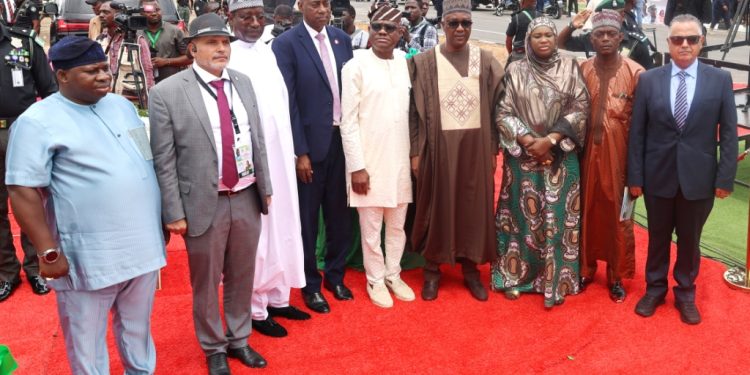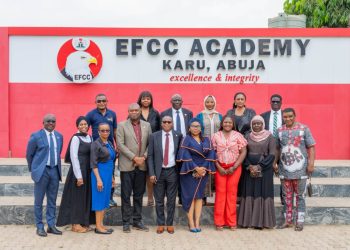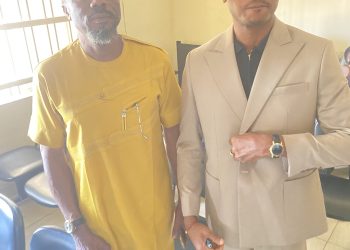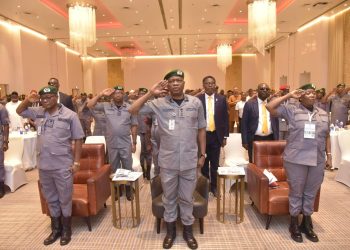By Nkechi Eze
The Economic and Financial Crimes Commission (EFCC) on Monday, June 30, 2025, marked a significant milestone in its infrastructural development drive with the commissioning of a newly completed access road leading to its permanent Academy site at Giri, Abuja. The road, which had been a major impediment to the commencement of full-scale development at the new site, was constructed by the Federal Capital Territory (FCT) Administration under the directive of Minister Nyesom Ezenwo Wike.
In an official signed statement, the spokesperson for the commission Dele Oyewale disclosed that speaking through the secretary to the Commission, Mohammed Hammajoda, at the commissioning ceremony, EFCC Chairman Ola Olukoyede expressed profound appreciation to President Bola Ahmed Tinubu and Minister Wike for their roles in making the project a reality. He described the road as a “critical infrastructure that will accelerate the take-off of the New EFCC Academy project and significantly enhance the Commission’s anti-corruption mandate.”
“With this road now in place, work will resume fully on the development of the New EFCC Academy, which is envisioned as a Centre of Excellence in financial crimes enforcement, training, and research,” Olukoyede said. He further disclosed that the Academy would also house a Cybercrime Research Centre and other specialised facilities aimed at building institutional capacity and deepening knowledge-based enforcement strategies. “This road not only provides vital access to the EFCC Academy; it is a strategic enabler for training anti-corruption officers who will sustain the momentum of the fight against corruption in Nigeria,” he added.
Recounting the challenges faced in accessing the Giri site prior to the road project, the EFCC boss noted that the Commission had reached an impasse until the FCT Minister intervened. “We were actually at a loss on how to navigate this challenge until the Honourable Minister of the FCT came to our rescue. He not only promised to construct the road, he delivered the project in record time,” he said. Olukoyede also acknowledged the support of the National Assembly leadership and other stakeholders who contributed to the success of the project.
President Bola Ahmed Tinubu, who was represented at the event by the Speaker of the House of Representatives, Hon. Tajuddeen Abbas, praised the EFCC and the FCT Administration for the collaboration that birthed the road. In his remarks, the President described the project as “a symbol of inclusive governance and national integration,” commending Minister Wike for aligning with the Renewed Hope Agenda of his administration.
“The road we commissioned here today in Giri District is more than an access way; it is a bridge of inclusion, a signal of recognition, and an instrument of national unity,” the President stated. He said the road exemplifies his administration’s commitment to balanced development across the Federal Capital Territory, adding that “no community is too small, no area too distant, no citizen too insignificant to benefit from the dividends of democracy.”
In his own remarks, FCT Minister Nyesom Wike reaffirmed the administration’s commitment to the holistic development of Giri District. He said the commissioning of the access road was only the first phase of a broader infrastructural plan for the area. “What we have done, having created this access road, is instruct the Executive Secretary of the FCDA and other relevant agencies to start working out details on how we’re going to develop the roads within the district,” he announced.
He emphasized that the EFCC stood to gain the most from the project, noting that the road had removed a major bottleneck to the development of the Commission’s training centre. “Like the Chairman said, they will now start the Academy immediately because they now have an access road that will allow them to move equipment and begin development. Once that happens, you’ll see others following suit and developing their own parts of the area,” he added.
The commissioning ceremony was attended by top government officials, representatives of security and anti-corruption agencies, traditional rulers, and residents of the Giri community, who welcomed the development as a harbinger of broader infrastructural and socio-economic transformation for the area.















